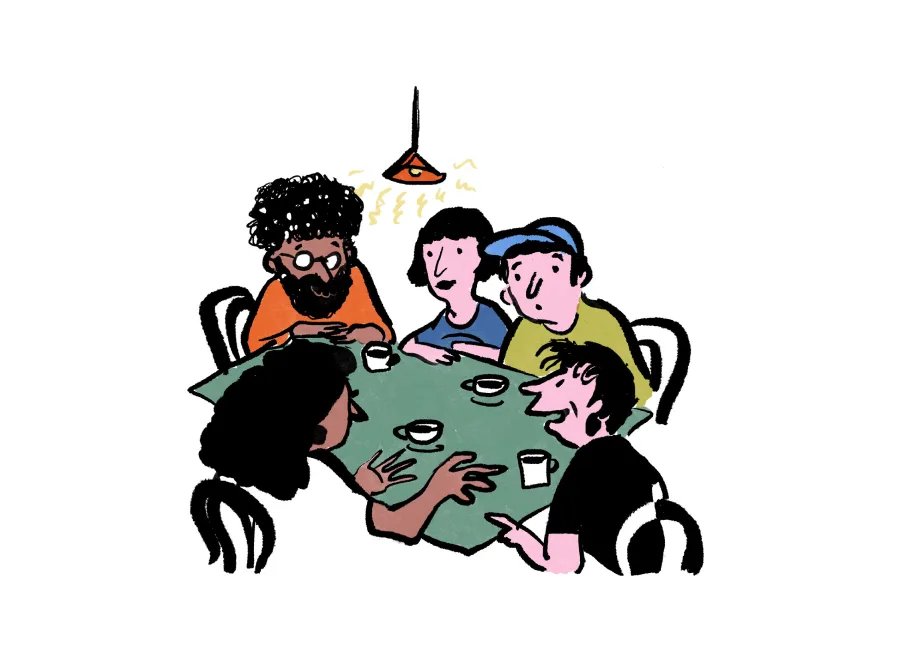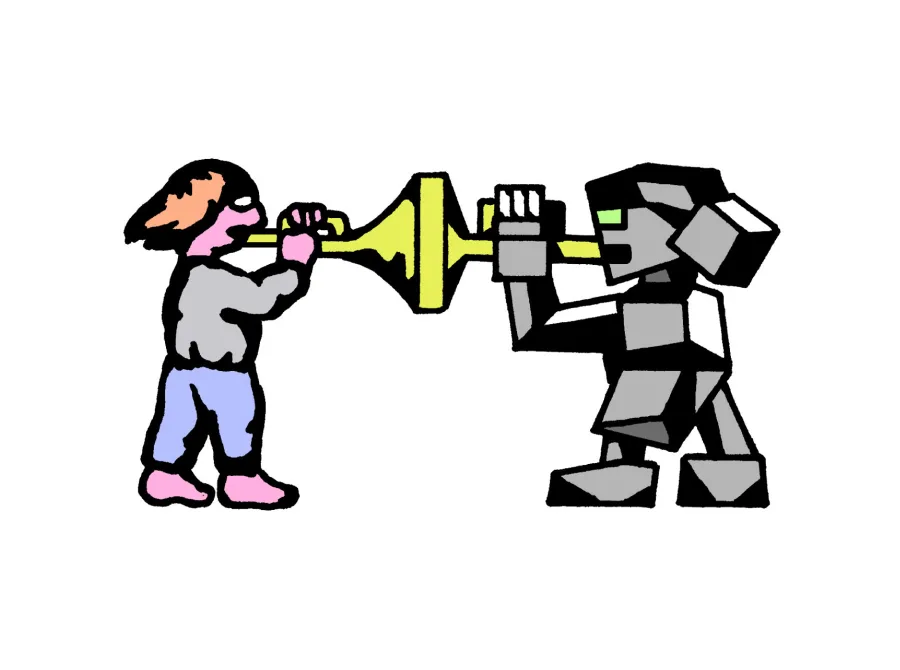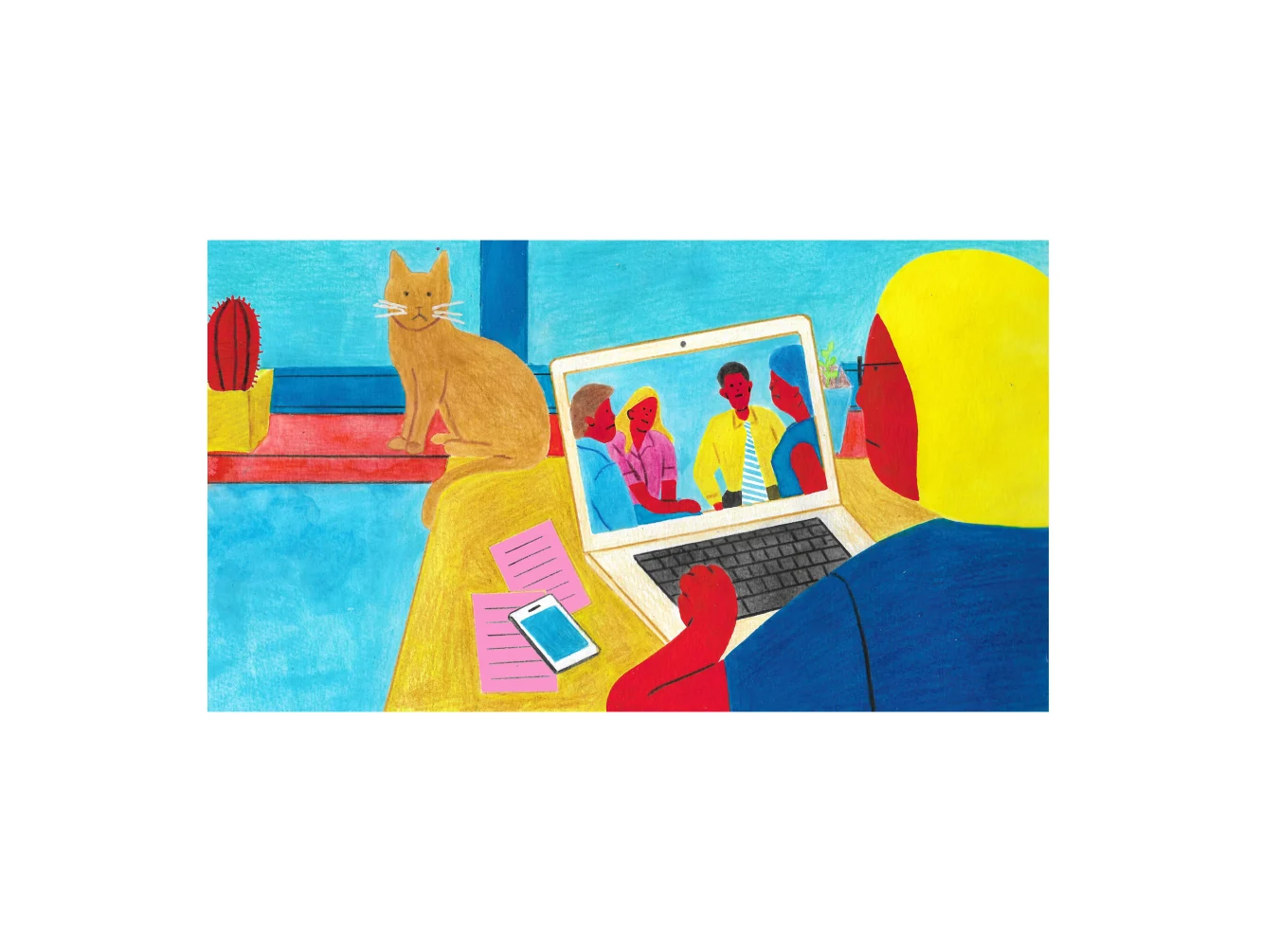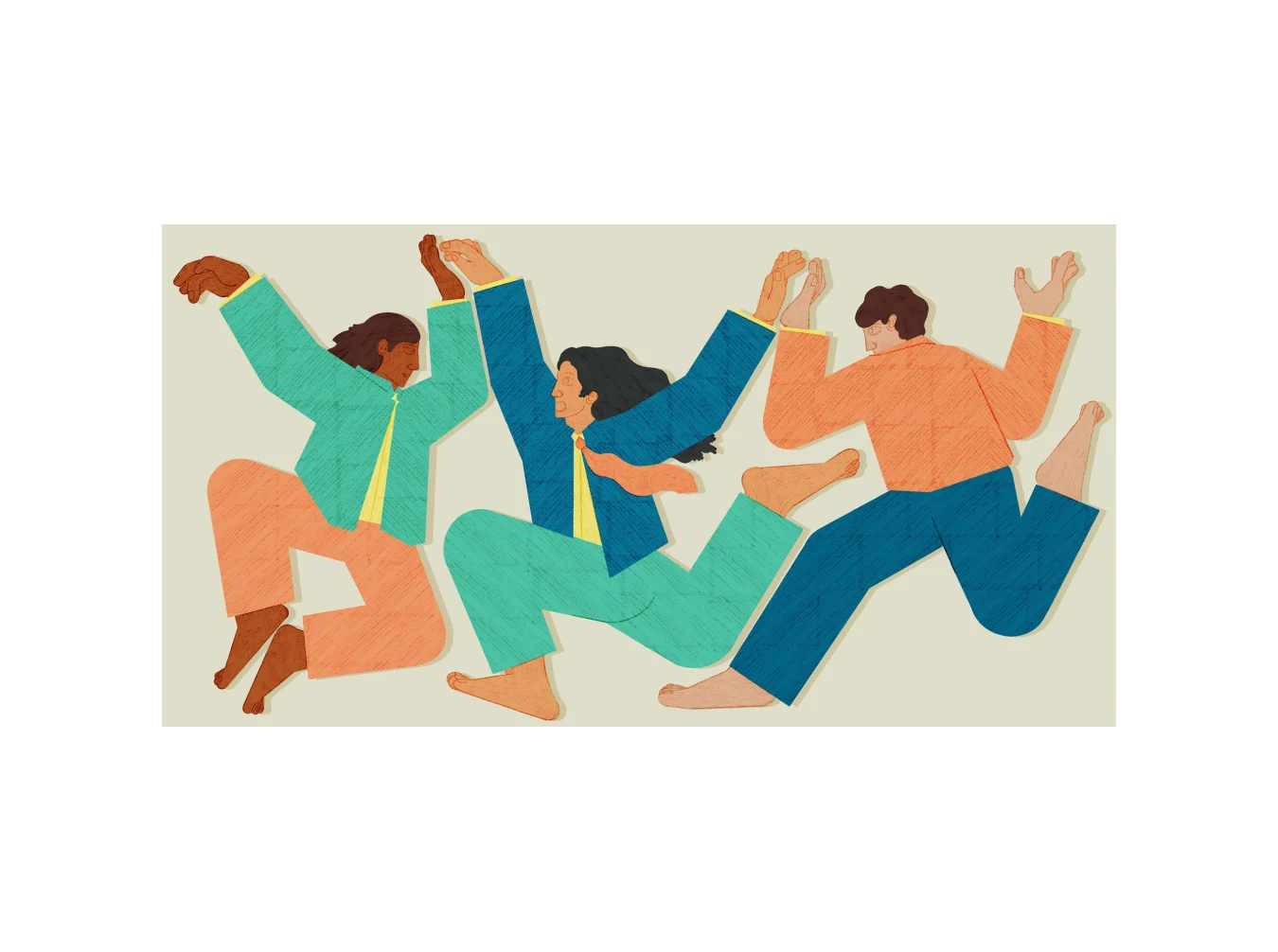
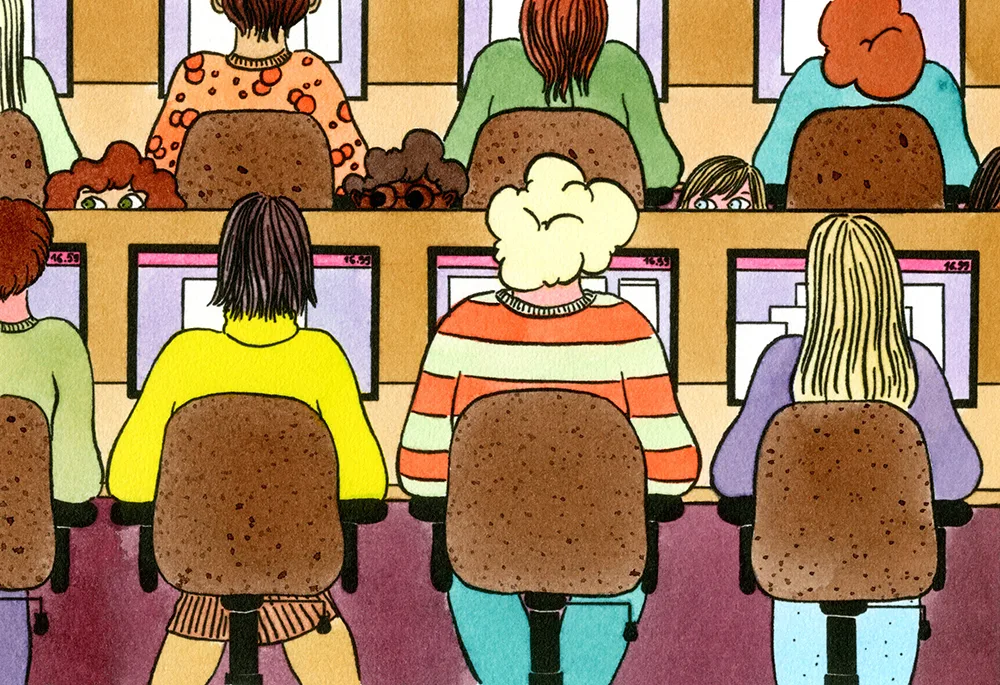
There are lots of things for creatives to think about beyond having good ideas. We’re here to help, with our advice series Stuff They Don’t Tell You. James Cartwright looks at where to work if you don’t have a set studio or office space.
Illustrations by Ellen van Engelen.
Since starting work on this article I’ve experienced and sometimes enjoyed over five different working environments, including my living room, home office, two train carriages, a shared studio space in north London and an ill-advised 20 minutes at a pub bench while waiting to meet a friend for a drink (unsurprisingly the least productive of my transient workspaces).
The flexibility of freelancing is such that I can more or less work from anywhere, but some venues are undeniably better than others.
Choosing a workspace is arguably one of the most overlooked aspects of running your own show, in part because there’s very little you actually need to get to work – a laptop and some wifi are the price of entry to the modern mobile workforce. But choosing your workspace wisely can have an enormous impact on your working life, your social interactions, commercial opportunities, mental health and general productivity. It can even have an impact on how you spend your free time.
Striking a balance between work and leisure is harder when there’s nobody else around to help.
In recent years the rise and rise of co-working spaces has come in to cater to this freelance problem. Take WeWork, the $20 billion co-working startup that’s sprung up in cities all over the world to cater to the needs of an abundant roving workforce. Since it first opened a site in New York in 2010, WeWork has expanded to include 207 locations across 20 different countries (and counting).
Like so many of its co-working competitors, WeWork advocates a lifestyle, it’s not just a desk space from which to make a living. Its members are, “creators who run the gamut from entrepreneurs, freelancers, and startups, to artists, small businesses and even divisions of large corporations.”
Its desks are designer, its wallpapers bright and invigorating, peppered here and there with motivational entreaties like “use your hustle,” and its free drinks are conspicuously craft. Which is to say that WeWork provides workspaces for a particular type of person with a certain set of needs.
James Bramble thought he might be that kind of person. Three years ago he set up his own business providing fundraising consultancy and support to charities and non-profits. At the time, WeWork had just launched a new space in London’s Aldgate. Brand new and more-or-less empty, it was offering discounts to early adopters, and James was drawn to its whiff of professionalism and pristine decor.
“I negotiated a big discount for three months, and it was really great as a motivational tool,” he says. “It got me out every day into a nice, bright, slightly swanky office surrounded by busy people doing busy things and bouncing ideas around. It made me feel like it was a proper thing I was doing rather than just some self-indulgent vanity project. I told myself that I was now a freelancer and it was something I properly committed to.”
In this sense a co-working space was exactly what James needed, giving him the confidence to pursue his new venture and a legitimate location to court new clients – “It allowed me to present myself professionally.”
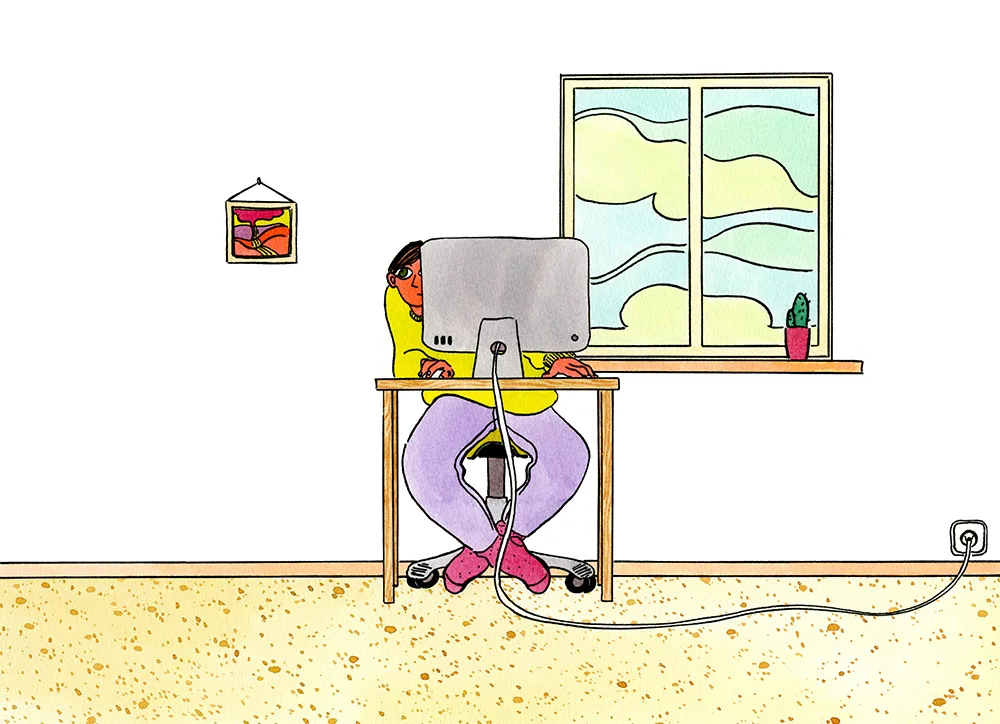
Another key selling point of co-working spaces is the opportunity they offer to network with other like-minded professionals. Their regular events encourage members to get up close and personal, connect and create opportunities for collaboration. It’s the USP they tend to hammer hardest in their marketing and one of the main reasons James decided that WeWork could be the place for him. But working in the charitable sector, he was an anomaly.
After three months, James moved on from WeWork (although he stresses the £660 monthly fee is “actually a really good amount for office space in a decent London location,” and that co-working helped him get his business off the ground).
Now he’s a freelance flaneur, moving around the city and choosing workspaces according to his daily needs. And although he no longer misses the motivational wallpaper, it can be a struggle to stay focussed at home and not let loneliness creep in. When work is busy that isn’t a problem, but the nature of freelance work is that it comes in fits and starts, and maintaining motivation when you’re on the hunt for clients can be exceptionally tough.
“When I'm between jobs, and the work I have to do is the work of finding work, remaining motivated to do that at home is difficult. Even though you need to do it, you're not being paid for it, there is not a set deadline, and there isn't a structure to make you do it. It's easy to let that slip. And of course that is fatal.”
The advantage of working from a co-working space or shared studio is that it guarantees (or at least offers the illusion of) structure. Working from home, where you also sleep, eat, socialize and relax, means that you control the hours you put in at your desk, you control when it’s time for a coffee break, and you’re the only one who can keep yourself from distraction. Striking a balance between work and leisure is harder when there’s nobody else around to help.
“Physically you need to make distinctions,” says freelance journalist and broadcaster Kieran Yates. “Trying not to work in bed where you sleep is a good start. Creating routine through physical spaces helps me to create mental routines too.”
Until recently, Kieran did all of her writing from the comfort of a chaotic little study beside her bedroom. When she moved house, she went back to working and sleeping in the same room, hence the importance of discerning between duvet and desk. But she’s thrived working from home in spite of the solitude.
“Freelancing helps my practice as much as it allows me to breathe and appreciate the privilege of time and space to meditate on things before I write them,” she says. “I found office spaces generally difficult to manage because they were at odds with the way that I was used to working. It was difficult to hone my interview skills in a fast-paced, high-pressure environment.”

Kieran has just a little more consistency in her working life than Johnny Drain, a freelance food researcher, writer, musician, and sometime football magazine publisher. He’s commissioned to work for months at a time on specific projects – unusual butters, new types of ice cream, the perfect ramen – and travels the world for different clients. This nomad status means he has no choice but to work on the move, from airport lounges, cafes, and sometimes from his canal boat. When possible, he chooses workspaces for inspiration as much as focus.
“I try to sniff out interesting nooks to sit and work in, but for stimulus rather than a particular set of conditions that I like,” he says. “Also, I've gotten quite into working outside as I walk, for things like planning, pondering difficult problems; even writing outlines of stories or crucial emails and jotting them on my phone as I go. A recent favorite has been a cemetery in Zürich close to the workshop I’ve been in. It sounds bleak, but it's remarkably beautiful come snow or sun—maybe the reminders of death encourage me to hurry up!
“But truly, it's about mindset: you could have the most perfect, serene workspace in the world but if you're not in the right mood, it counts for nothing.”
It made me feel like it was a proper thing I was doing rather than just some self-indulgent vanity project.
Which brings us to our final question (quick update, it’s now three days later, and I’m typing from my garden). How does a solitary freelancer cope when the creative juices aren’t flowing?
If the work isn’t coming do you, your own boss, just give yourself the afternoon off? “Oh boy, yes!” Johnny says. “That's the killer really. Firstly, I do a lot of pacing and talking to myself: sometimes that'll shake it, but usually it's the first warning sign that creative block isn’t going to budge. When those moments hit, it's best to try to disengage fully.
“It's easy to kid yourself that time off is time wasted, but doing anything different, enriching, enjoyable, or relaxing for five minutes to several hours is almost always productive in the long run.”
Like everything in life, learning to work for yourself takes time—so don’t rush it—but following these five tips might help you get your workspace right...
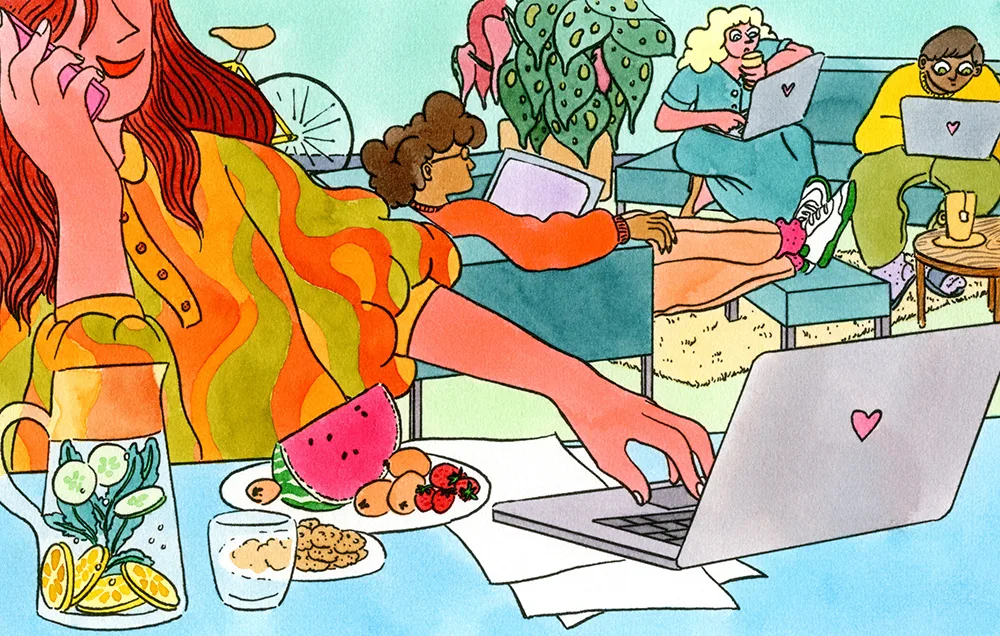
Work out your needs
You know how you work best and what you need to run your business properly. If you don’t, set aside time to really focus on figuring it out. Are you comfortable being solitary or is it company you crave? Does the work you do require a steady stream of close collaborators? Is your tiny bedroom really sufficient to give you space to breathe?
Asking yourself these questions can help you figure out an ideal workspace, and that might mean trying out different environments along the way.
Define your boundaries
Like Kieran says, don’t work in bed, or if you do occasionally lapse into the odd hour of horizontal labour, make sure it’s only for certain tasks and doesn’t become habitual. Likewise if you’re working in a shared space make sure your studio mates know when you need to focus. Maintaining the illusion of discipline will help you get stuff done.
Stick to a routine
18-year-old me thinks I’m an idiot for saying this, but when you work for yourself, having some semblance of a routine is essential. If you don’t establish one early there’s a danger that the whole week merges into one sprawling mass of laptop time.
It might not be necessary to structure your days by half-hour intervals (although plenty of people thrive with that kind of rigid approach) but at least booking in other activities around which you can anchor your work is the key to not going insane.
Let yourself off the hook
Whether it’s Protestant work ethic, Catholic guilt, or just the culture of chasing commercial success, you will always be able to find an excuse to add more work to your week. Cut it out. Let it go. Take some time away from the grind. Like Frankie says, sometimes it’s best to just relax.
But not too much
Seriously, put some clothes on and finish that commission today.
(Final update: I’m doing the last little edits sat outside the broken toilet of a commuter train. It stinks. Sure, freelance is flexible, but it isn’t all glamour you know.)





